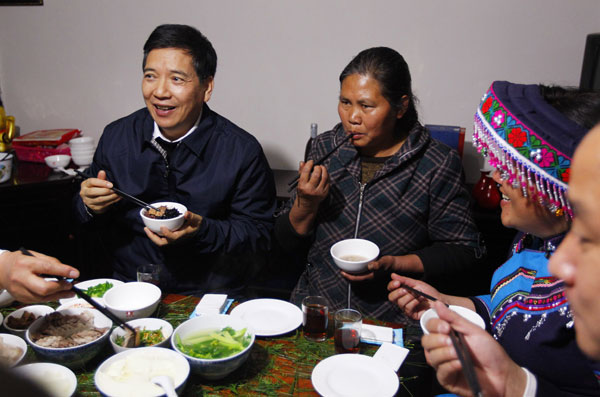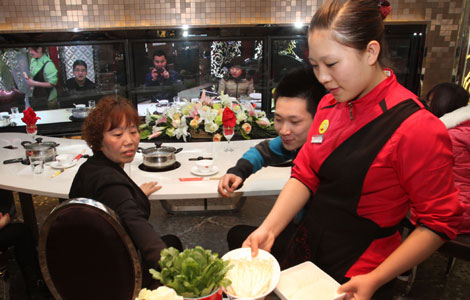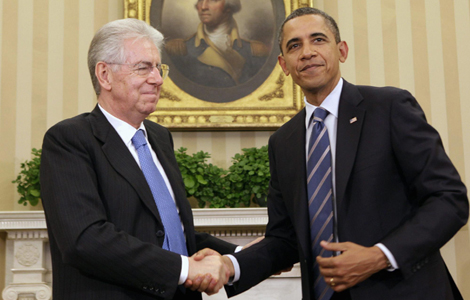Contact cards connect villagers and officials
Updated: 2012-02-11 08:33
By Li Yingqing and Guo Anfei (China Daily)
|
|||||||||
KUNMING - Zhang Renquan, a villager in Southwest China's Yunnan province, never expected he would receive a visit and greetings from the top official of the province before the start of Chinese New Year.
"The Party secretary made and ate a dinner with us, chatted and said Happy New Year to us with a toast," recalled the 42-year-old Zhang, who lived in Bixi village in Mojiang Hani autonomous county. "He even stayed at my home for a night and paid me a fee."
Many other villagers gathered at his home after hearing that the top official of the province was paying a visit. "All of us were so glad," Zhang said.
The Party secretary of Yunnan province, Qin Guangrong, asked about how the villagers make their livings and about their dealings with officials, Zhang said.
|
 |
|
Party chief of Yunnan province Qin Guangrong dines with a family in Bixi village in the Mojiang Hani autonomous county. Yang Zheng / for China Daily |
With the government's help, the village of 47 households was moved in 2010 from a previous location where it had been vulnerable to landslides.
"The new practice - the one that the provincial government started and that encourages direct contact between officials and residents - is really helpful," Zhang told Qin, showing him a card bearing the telephone numbers of prominent county officials.
The cards have helped alleviate various concerns in the villages, Zhang said. In one instance, they played a role in getting a wooden bridge replaced.
"The old wooden bridge was very dangerous and a villager once fell off it ... and was drowned," Zhang said.
Zhang said the head of the village used the card to get in touch with officials. That led to the plan to build a new bridge.
Feng Liyin, head of the village, said the 8-meter bridge cost 120,000 yuan ($19,000), an amount paid by the township government. The project is expected to be finished by April.
"Once the bridge is finished, I'm not going to worry about floods any more," Zhang said.
For all their benefits, the closer relations with villagers have also placed pressure on local officials, said Chen Jiaxing, Party chief of Lianzhu town, which administers Bixi village.
"Each official in our town is responsible for staying in touch with three to four families who can call them for anything they want," he said. "All of us have to keep our mobile phones on 24 hours a day, as some villagers may call at night."
He said officials will work to resolve issues that they can and will enlist the help of higher authorities on those that they can't.
"Although we are now much busier, we are glad to see the villagers are happier," he said.
Qin also applauded the new practices.
"Troubles can be solved a lot more easily if officials are more active," he said. "We should continue with these practices and never forget the folks living out in the countryside."
"We will continue to try to establish the favorable conditions needed to speed up the development of rural areas and improve the lives of our people."
The harmony that exists between Bixi village residents and officials results from the local government's resolve to keep the people's needs in mind, a resolve that only became stronger following a recent period of tension.
In July 2008, a violent clash broke out in Yunnan province's Menglian county. The trouble began when farmers complained that their land rights had been violated by a local rubber company. They asked both the company and the government for redress and, not receiving a response they deemed satisfactory, clashed with police.
The outbreak brought relations between farmers and officials to a nadir, said Yan Bodan, a villager in Menglian county who, during the clash, had led his fellow villagers to smash police cars and use knives to fell trees that were then set up as roadblocks.
"Villagers blocked the road leading to the village to stop government officials from entering, and the ID cards of some of the ones who had entered the village were snatched away," Yan recalled.
After the incident, the Menglian government changed its manner of governing, working harder to protect residents' interests. Several measures were taken to deal better with residents' concerns and maintain closer relations between government officials and residents.
The work has helped to change opinions. "We used to hate officials," said Yan, who has joined the Party and become a village official. "But now we get along as brothers."
"Without the support of the people, it will be impossible for Yunnan to meet its goal for better development," Qin said.
Wang Xiaodong contributed to this story.
Hot Topics
Kim Jong-il, Mengniu, train crash probe, Vaclav Havel, New Year, coast guard death, Internet security, Mekong River, Strait of Hormuz, economic work conference
Editor's Picks

|

|

|

|

|

|







